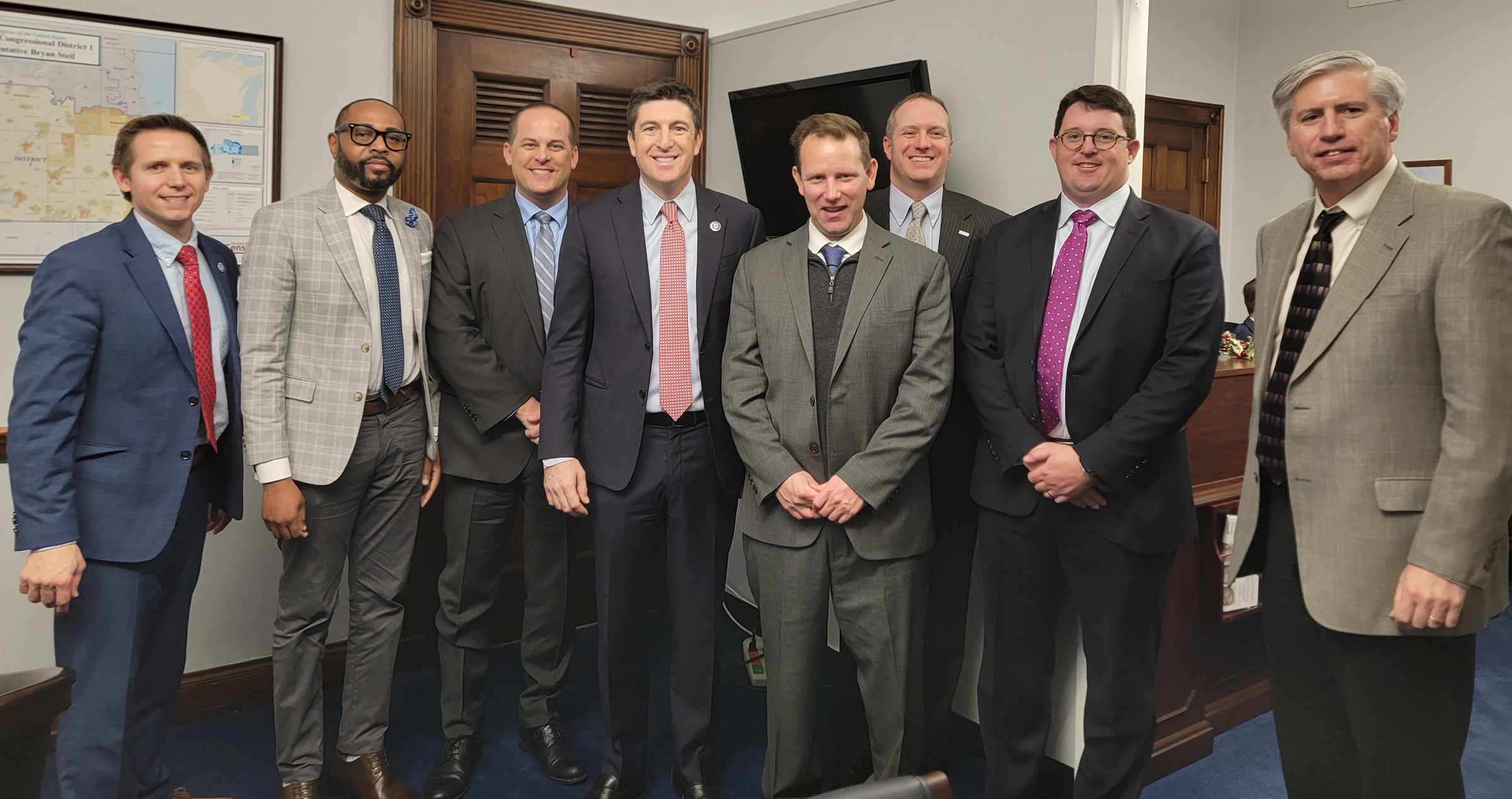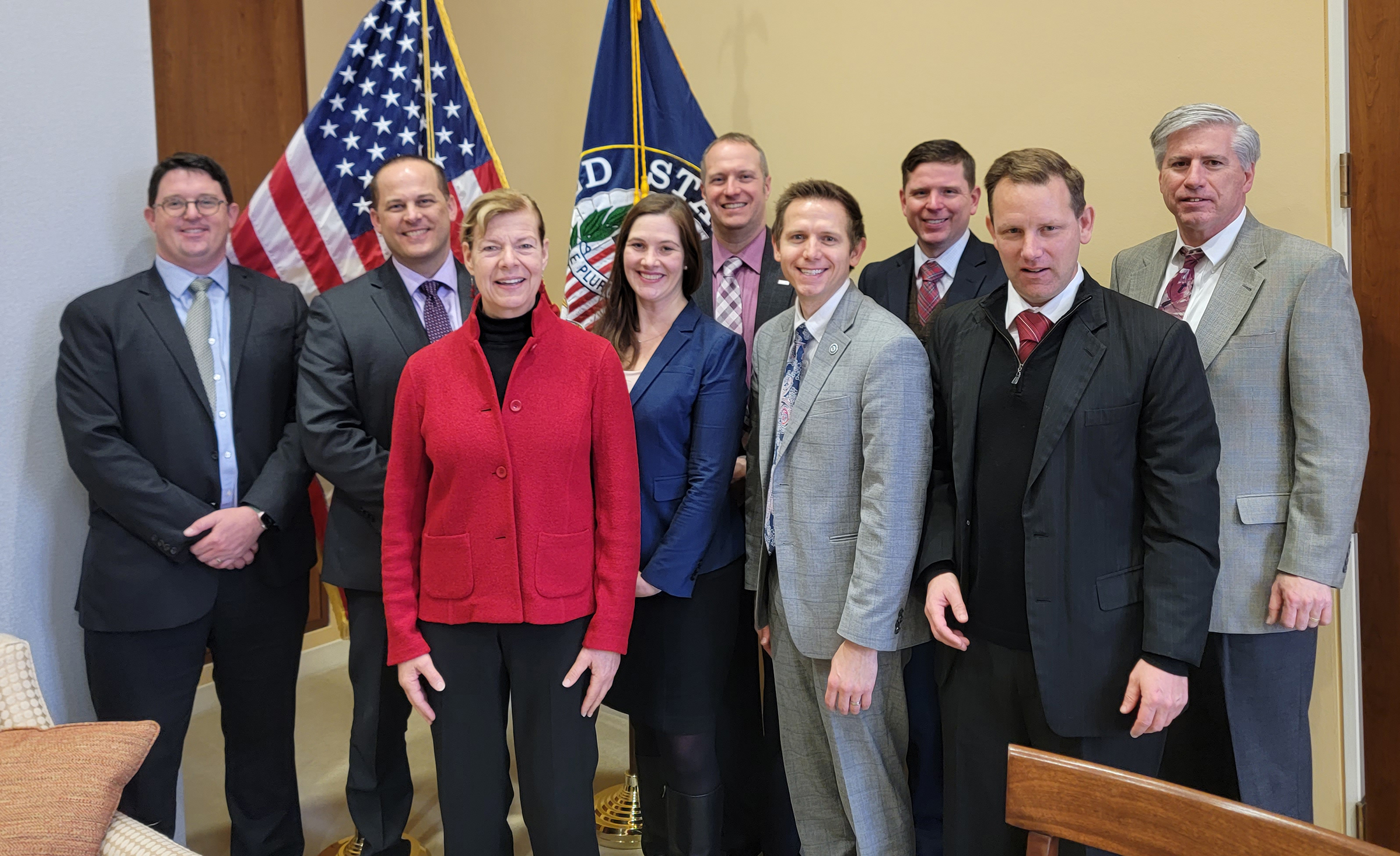The Wisconsin Hospital Association brought a group of hospital leaders to Washington, D.C. on Dec. 6 - 7 to advocate with Wisconsin’s Congressional Delegation for hospital and health system year-end priorities. Joining the group were Bob Van Meeteren of Reedsburg Area Medical Center, Jim Nelson of FortHealthCare, Jeremy Levin of the Rural Wisconsin Health Cooperative, Nathan Franklin of Gundersen Health, Tony Curry of Advocate Aurora Health, Brad Wolters of Marshfield Clinic Health System, Reggie Newson of Ascension Wisconsin, Brian Vamstad of Essentia Health, and Briana Nord-Parish of Allina Health.
Many of the hospital leaders participated in an Advocacy Day event hosted by the American Hospital Association (AHA) on Dec. 6. AHA provided packets of informational papers including a number of the same year-end priorities WHA has been advocating for that they have also been working to get included in a year-end omnibus package. While it is unclear what Congress will be able to get passed at this time, multiple members of Wisconsin’s Congressional Delegation told WHA’s group of hospital leaders they expect Congress to pass a one-week short-term continuing resolution to fund the government through Dec. 23, given that the current continuing resolution ends on Dec. 16. Most of Wisconsin’s Congressional Delegation also remain optimistic that would give Congress more time to negotiate a larger spending package that may include several hospital priorities, but that nothing is certain at this point.
 Hospital leaders meet with Rep. Bryan Steil (fourth from left) during their visit to Washington D.C. Dec. 6-7.
Hospital leaders meet with Rep. Bryan Steil (fourth from left) during their visit to Washington D.C. Dec. 6-7.
WHA has been advocating for Congress to extend the
rural hospital designations for Medicare-Dependent and Low-Volume Adjustment hospitals that are currently slated to expire Dec. 16. These designations impact at least 16 Wisconsin hospitals to the tune of over $19 million in higher Medicare payments annually and are essential in reducing the losses these hospitals take on Medicare patients. Due to their smaller size, these hospitals do not have the volumes of commercially insured patients necessary to offset the losses they would take at normal Medicare rates, which reimburse hospitals at about 73% of what it costs them to provide Medicare services, on average.
The group of hospital leaders also advocated for Congress to continue funding incentives to participate in Medicare’s value-based payment programs, which currently expire at the end of the year. Medicare spends less on average to cover Wisconsin Medicare patients than the national average, and yet Wisconsin health care providers are not typically rewarded for this. Value-based payments are one of the few Medicare programs that reward Wisconsin health care providers for providing high-quality and low-cost health care.
 Hospital leaders meet with Sen. Tammy Baldwin (third from left) during their visit to Washington D.C. Dec. 6-7.
Hospital leaders meet with Sen. Tammy Baldwin (third from left) during their visit to Washington D.C. Dec. 6-7.
Since April of this year, WHA has been working to build support for making permanent many of the
regulatory flexibilities hospitals have had access to under the public health emergency (PHE). The current PHE is expected to last through mid-April, but after that the fate of these regulatory flexibilities is uncertain. WHA has advocated for four main flexibilities, including:
- Continuing Medicare’s Coverage of telehealth by eliminating geographic and site restrictions.
- Making the Acute Hospital Care at Home Program permanent.
- Eliminating both the 96-hour condition of payment for critical access hospitals along with the 96-hour average-length-of-stay condition of participation.
- Eliminating the requirement that patients stay in a hospital for three midnights prior to Medicare covering a nursing home stay upon a patient being discharged.
The hospital leaders participating in these Capitol Hill visits described the immense challenges hospitals are dealing with in the wake of the COVID-19 pandemic that make these continued flexibilities essential tools for hospitals. Hospitals continue to deal with extremely tight capacity challenges due to the ongoing workforce shortage and the lack of adequate nursing home beds to discharge patients to once they complete their hospital stay.
In addition to all these priorities, the WHA’s group of hospital leaders also discussed the
financial challenges that exist in 2022. Inflation has increased the cost of supplies and the workforce shortage has greatly increased the cost of labor, yet Medicare and Medicaid reimbursements remain stagnant, and it is very difficult to pass along cost increases to commercial insurance because employers are also feeling the pinch of inflation. With all these challenges, many hospitals have been running large operating deficits in 2022. WHA’s group of hospital leaders asked Wisconsin’s Congressional delegation to support adding additional hospital relief in a year-end Congressional spending package, such as a reduction in the physician and home health cuts slated to take effect in 2023, a return of the 2% sequestration holiday, and for the Senate to pass the
Improving Seniors’ Timely Access to Care legislation, which makes many improvements to the prior authorization process under Medicare Advantage.
WHA will continue to monitor developments in Congress as the end of the year approaches. Contact WHA Vice President of Federal and State Relations
Jon Hoelter with questions.